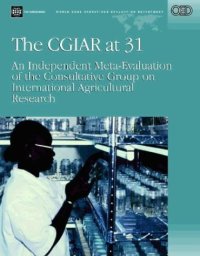
Ebook: The Cgiar at 31: An Independent Meta-Evaluation of the Consultative Group on International Agricultural Research
Author: Uma J. Lele
- Genre: Mathematics // Symmetry and group
- Series: Operations Evaluation Studies
- Year: 2004
- Publisher: World Bank Publications
- Edition: Revised
- Language: English
- pdf
The CGIAR at 31, a meta-evaluation of the CGIAR, finds that CGIAR’s productivity-enhancing research has had sizeable impacts on reducing poverty by increasing employment, raising incomes, lowering food prices, and releasing land from cropping. However, the CGIAR is facing huge challenges. It is less focused on enhancing agricultural productivity than it used to be. The report finds that CGIAR’s current mix of activities reflects neither its comparative advantage nor its core competence. It also finds that CGIAR has not responded sufficiently at the System level to the biotechnology revolution, the increasing importance of intellectual property rights, and the growth of private sector research.
The evaluation makes several recommendations to address the challenges facing CGIAR, to enhance CGIAR’s role in agricultural research into the future.